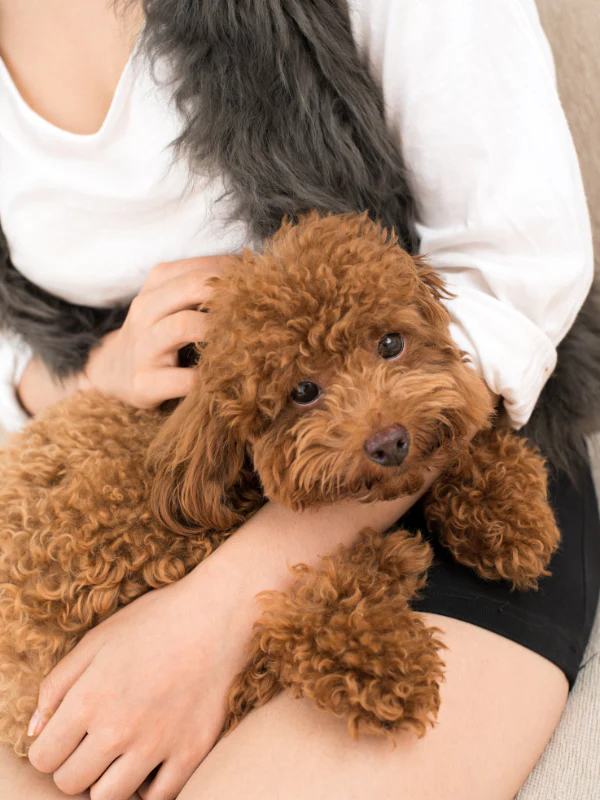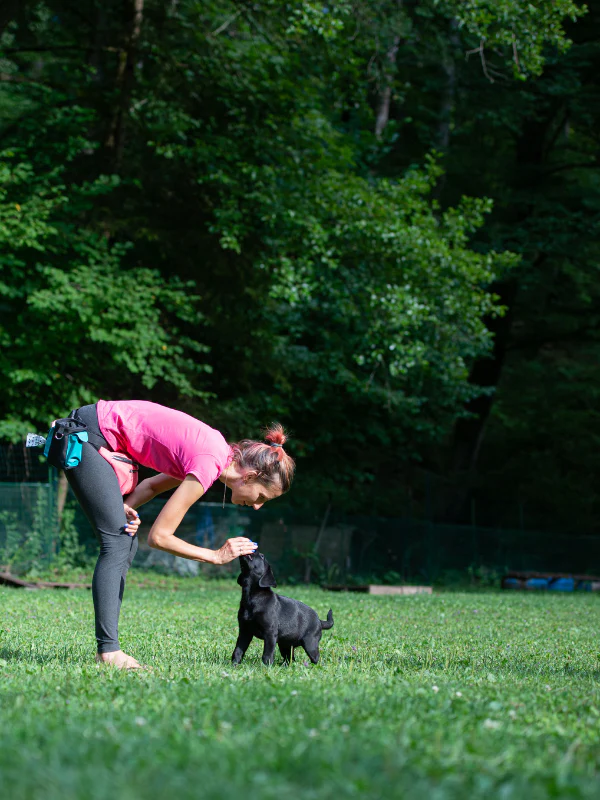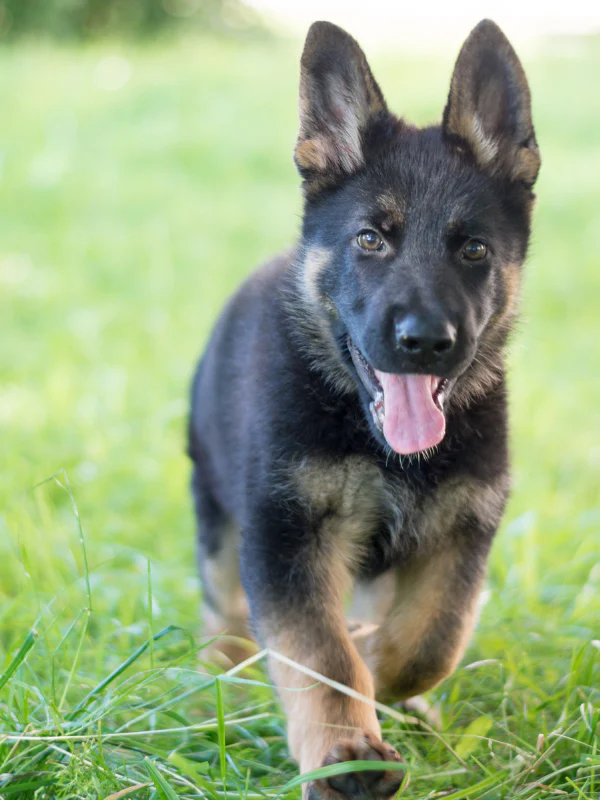A deep connection with your puppy lays the foundation for a cherished, lifelong companionship. It sets the stage for effective training and a harmonious living arrangement. A well-bonded puppy isn’t just a pet—it’s a loyal friend and a cherished member of the family.
Understanding Your Puppy’s Perspective
When a new puppy joins your family, it’s important to try to view the world through their eyes. Their early weeks are filled with new experiences—every day brings unfamiliar scents, sights, and sounds. Being mindful of these changes can help you create a soothing environment for your puppy. Understanding leads to empathy, which is key to building a strong bond.

The Importance of Socialization for Puppies
Socialization is the process of introducing your puppy to a wide range of experiences, environments, and beings. Early socialization can help your puppy grow into a confident and well-adjusted adult dog. Exposing your puppy regularly to other animals, people, and different settings will nurture curiosity and reduce fear, helping your puppy develop into a friendly and well-mannered companion.
The Benefits of Bonding with Your Puppy
Building a bond with your puppy offers countless advantages. It fosters mutual respect, improves behavioral responses, enhances training efficiency, and reduces stress for both you and your puppy. A strong bond also contributes to a happier, healthier dog, minimizing potential behavioral problems down the line.
Creating a Safe and Comfortable Space for Your Puppy
A secure and cozy environment is essential for fostering a strong bond with your puppy. Provide them with their own designated area where they can relax and play. Ensure that their surroundings are free from hazards. A comfortable puppy is a content puppy, and a content puppy is more likely to form a strong attachment to their owner.
Effective Communication with Your Puppy
Clear communication is vital in developing a strong bond with your puppy. Recognize the unique ways puppies communicate—through body language, vocalizations, and behaviors. Responding appropriately to their cues builds trust, which strengthens your bond. Use consistent, clear commands during training to establish effective communication.
Using Positive Reinforcement in Training
Positive reinforcement is a critical element in training and bonding with your puppy. Rewarding good behavior with treats, toys, or praise encourages your puppy to repeat the action. This not only aids in successful training but also helps build a positive relationship.

The Role of Play in Strengthening the Bond
Playtime isn’t just about fun—it’s an essential bonding opportunity. Spend regular time playing with your puppy using toys or engaging in simple games like fetch. Playing together fosters mutual respect, trust, and affection, deepening the connection between you and your puppy.
Nourishing the Bond During Feeding Time
Mealtime presents a perfect chance to strengthen your bond with your puppy. Make this time calm and enjoyable. Handfeeding a portion of their meal can help establish trust and reinforce your role as the provider of resources.
Establishing a Consistent Routine for Your Puppy
Puppies thrive on routine. A consistent daily schedule for meals, bathroom breaks, exercise, playtime, and rest provides your puppy with a sense of security and supports bonding. A predictable routine also makes training more effective.
The Power of Physical Contact in Bonding
Physical touch plays a significant role in building a strong bond with your puppy. Gentle petting, stroking, or grooming can be calming for your puppy and serves as a powerful bonding tool. Always ensure your touch is gentle and loving, and never force physical contact.
Basic Training: The Foundation of a Well-Behaved Puppy
Basic training is essential for a well-mannered puppy and forms a key part of the bonding process. Training should be a positive and enjoyable experience for both you and your puppy. Start with simple commands like “sit,†“stay,†and “come.†Be patient, consistent, and always reward good behavior.
Exploring the Great Outdoors Together
Outdoor activities offer wonderful opportunities to deepen your bond with your puppy while providing necessary exercise and stimulation. Simple outings like walks in the park or visits to pet-friendly stores can be exciting new experiences for your puppy. Always ensure your puppy is safe and comfortable during these adventures.

Mental Stimulation: Challenging Your Puppy’s Mind
Mental stimulation is just as important as physical exercise for your puppy’s development. Engage your puppy’s mind with training exercises, puzzle toys, and interactive games. Providing mental challenges is a great way to connect with your puppy and strengthen your bond.
Handling Puppy Separation Anxiety
Separation anxiety is a common issue in puppies. It’s important to teach your puppy that it’s okay to be alone for short periods. Gradual training and creating positive associations with alone time can help alleviate separation anxiety. A calm and confident puppy is better equipped to form a strong bond with their owner.
Veterinary Visits: More Than Just Health Checks
Regular vet visits are vital for your puppy’s health. These visits also present opportunities to socialize your puppy with new people and environments. Make vet visits as positive as possible by using treats and praises to avoid creating fear or stress.
Grooming: Beyond Just Keeping Your Puppy Clean
Grooming sessions are excellent opportunities for bonding while maintaining your puppy’s cleanliness and health. Regular grooming allows you to check for skin issues or parasites. Make grooming a pleasant experience with plenty of treats and praises.
Addressing Behavioral Issues in Puppies
Early intervention is crucial in addressing and correcting behavioral issues with your puppy. Always use positive reinforcement techniques and avoid punishment. If needed, don’t hesitate to seek guidance from a professional dog trainer or behaviorist.
The Value of Patience in Building a Strong Bond
Patience is essential when building a strong bond with your puppy. Each puppy is unique and learns at their own pace. Celebrate small achievements and remain patient through setbacks. Remember, the bonding process takes time, but the rewards are well worth it.
Your Emotional State and Puppy Bonding
Puppies are highly attuned to the emotions of their human companions. Try to stay calm and positive around your puppy. Negative emotions like anger or frustration can affect your bond and influence your puppy’s behavior and well-being.
Involving Family in Puppy Bonding
Including all family members in the care of your new puppy can make the puppy feel more welcomed and loved. It also helps ensure consistency in training and routines.
Building a Bond with a Rescue Puppy
Forming a bond with a rescue puppy may require additional patience and love. Move slowly and allow the puppy to adjust to the new environment. Consistent, positive interactions can help your rescue puppy learn to trust and develop a strong bond.
Common Pitfalls in Puppy Bonding
Avoid common mistakes like inconsistent rules, negative reinforcement, and expecting too much too soon. Consistency, patience, and positive interactions are key to building a strong bond.
The Long-Term Benefits of a Strong Puppy Bond
The effort invested in building a strong bond with your puppy has lasting benefits. A strong bond enhances your puppy’s confidence, improves their behavior, and contributes to their overall happiness and well-being.
FAQs
1. How can I earn my puppy’s trust? Earning your puppy’s trust involves consistent, positive interactions. Use positive reinforcement during training, provide a safe and comfortable environment, and spend quality time with your puppy.
2. Why isn’t my puppy bonding with me? Several factors can impact puppy bonding, including insufficient socialization, inconsistent training, negative reinforcement, or even medical issues. If you’re struggling to bond with your puppy, consider consulting a professional dog trainer or behaviorist.
3. How long does it take to bond with a puppy? The time it takes to bond with a puppy varies. For some, it might take a few weeks, while for others, it could take several months. The key is to be patient, consistent, and positive.
4. How do I know if my puppy is bonded with me? Signs of a strong bond include your puppy seeking your attention, following you around, responding to your commands, and showing affection. A bonded puppy feels secure and comfortable around you.
5. Can older puppies form strong bonds? Absolutely! Age doesn’t limit the ability to form a strong bond. With patience, love, and consistent training, older puppies can bond strongly with their new owners.
6. How important is socialization in puppy bonding? Socialization is crucial in puppy bonding. It helps your puppy become a well-adjusted adult dog. Socialized puppies tend to be more confident, less fearful, and easier to bond with.
Record Button On Iphone,Online Screen Control,Android Parental Control Screen Time
Jilin Province Yuaoda Trading Co., Ltd , https://www.yuaodacn.com